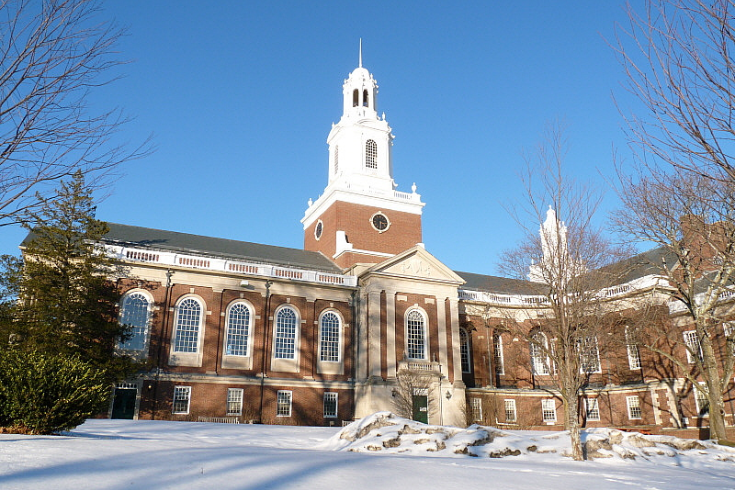‘Black Lives Matter’ and Newton history
October 6, 2020

Photo Credit: Lorianne DiSabato via Flickr
by Joyce Lazarus
The “Black Lives Matter” movement challenges us to acknowledge the systemic racial injustice in American society and inspires us to remedy inequities which have kept people of color from advancing and from realizing their full potential.
Recent incidents of police brutality against Blacks, including the murders of George Floyd, Breonna Taylor, and so many others, are a reminder of how far we still have to go before the United States comes even close to living up to the ideals of equality and justice expressed by our Founding Fathers.
This movement prompted me to examine the history of my city, Newton, to study some of its failings and achievements in its treatment of people of color.
The Jackson Homestead at 527 Washington Street, Newton Corner was a good starting point for this study, since it traces the history of a prominent white Newton family, the Jacksons. They were among the earliest settlers here in the mid-seventeenth century when Newton was still a part of Cambridge. The museum exhibit forces us to acknowledge that enslaved people lived and toiled on the Jackson’s land until 1783, when slavery was abolished in Massachusetts. The Jackson’s comfortable lifestyle for many generations was achieved only at the expense of their enslaved workers’ harsh labor and loss of freedom.
William Jackson (1783-1855) moved into the Homestead in 1820. William, a prominent judge and congressman, was an abolitionist who offered his home as a safe haven for runaway slaves. The Jackson Homestead served as a “station” on the Underground Railroad, mentioned in both written family reminiscences and oral accounts.
William Jackson’s daughter, Ellen, recalled a night in December 1848 when William Bowditch of Brookline brought a runaway slave to the Homestead where he stayed until he could be taken to freedom. As mentioned in the National Park Service Guide to the Jackson Homestead, Ellen Jackson wrote:
“One night between 12 and one o’clock, I well remember father was awakened by pebbles thrown against his window. He rose and asked what was wanted? Bowditch replied it was he, with a runaway slave whom he wished father to hide till morning, and then help him on his way to Canada, for his master was in Boston looking for him. Father took him in and next morning carried him 15 miles to a Station where he could take a car for Canada.”
The Jackson family’s tradition of activism extended to William’s brother, Francis, and continued long after William’s death in 1855. In 1865 Ellen Jackson helped to found the Freedmen’s Aid Society in Newton, which sent donated bedding, clothing, and books to two Black universities, Hampton and Tuskegee Institutes. Ellen served as Freedmen’s Aid Society president until her death in 1902.
Another prominent Newtonian, Nathaniel T. Allen (1823-1903), contributed to making Newton a more racially inclusive and progressive city. Allen was principal at the State Normal School at West Newton until it relocated to Framingham in 1853 and ultimately became Framingham State University. Allen then became principal of the West Newton English and Classical School, known as the “Allen School,” from 1854 until his retirement in 1900.
Nathaniel and his wife, Caroline, created a boarding school that was a century ahead of its time in its educational goals and its inclusive, diverse student body. The Allens taught co-educational classes, enrolled Black students, and included physical education as part of their curriculum, along with dancing, music, art, traditional academic studies, and ethics. Guest lecturers included luminaries such as Ralph Waldo Emerson. The Nathaniel T. Allen House, at 35 Webster Street in West Newton, is owned by the Newton Cultural Alliance.
Newton has made additional strides toward becoming an inclusive community since it became the home in 1874 of the Myrtle Baptist Church at 21 Curve Street, West Newton. Celebrating 146 years, it is one of the oldest Black churches in Boston, noted for its two beautiful stained-glass windows, depicting “Philip Baptizing the Ethiopian Eunuch” and “The Ascension.”
Reverend Edmund Kelley organized a group of worshippers and became the first pastor of Myrtle Baptist Church in 1874. A former slave, Kelly led an inspirational life. While still enslaved, he was licensed to preach by the Mission Church of Columbia, Tennessee in 1842. Ordained as an evangelist there in October 1843, he went on to help organize the First Negro Baptist Church in Columbia, Tennessee. After gaining his freedom, he traveled extensively, preaching and organizing churches and serving in leadership positions at national Baptist conventions. Reverend Kelley was among the delegates of Black pastors who met with both Presidents Abraham Lincoln and Andrew Jackson.
In 1968, the Myrtle Baptist Church became a place of refuge and solace for the entire city of Newton after the assassination of Dr. Martin Luther King, Jr. Dr. King had often preached at Myrtle while a student at Boston University.
We recognize that the United States still has far to go to bring about full economic and racial justice in order to live up to the ideals promised in the Declaration of Independence. Still, we can proudly mark the progress made in Newton toward becoming an inclusive city that welcomes people of all races, creeds, and religions.